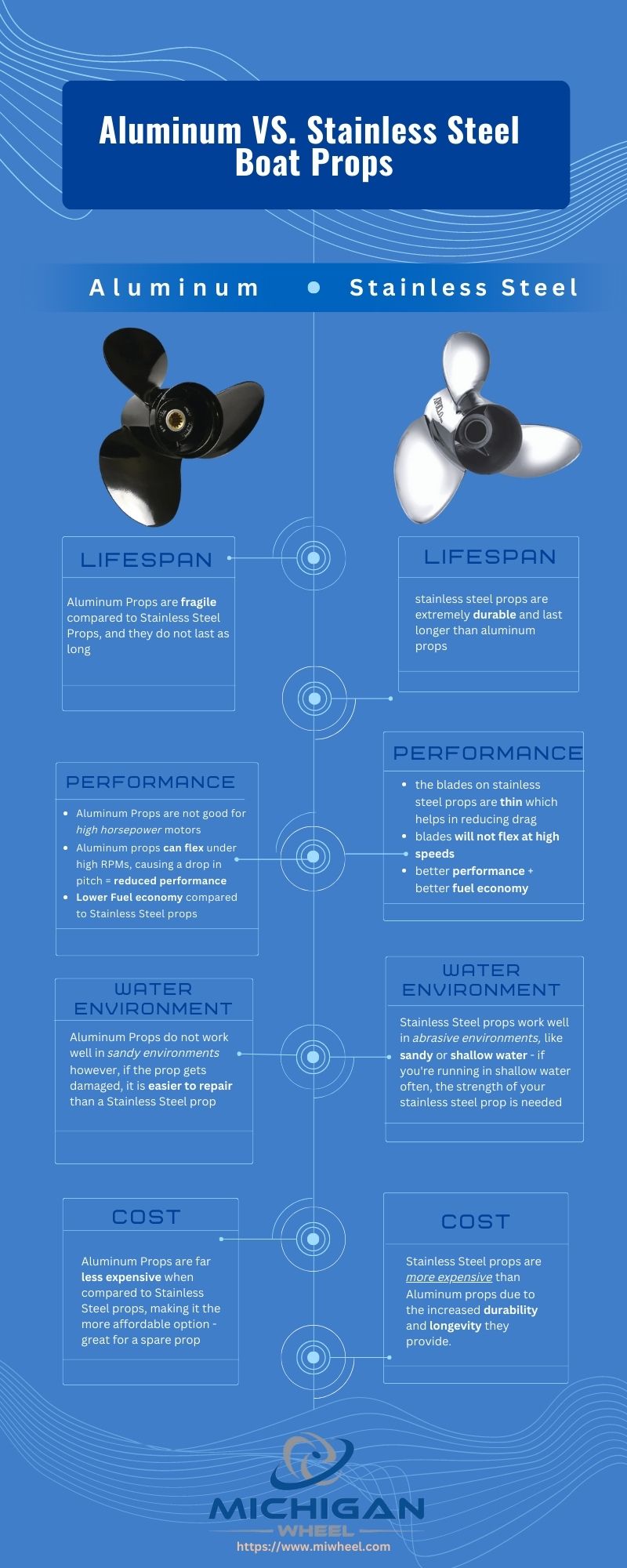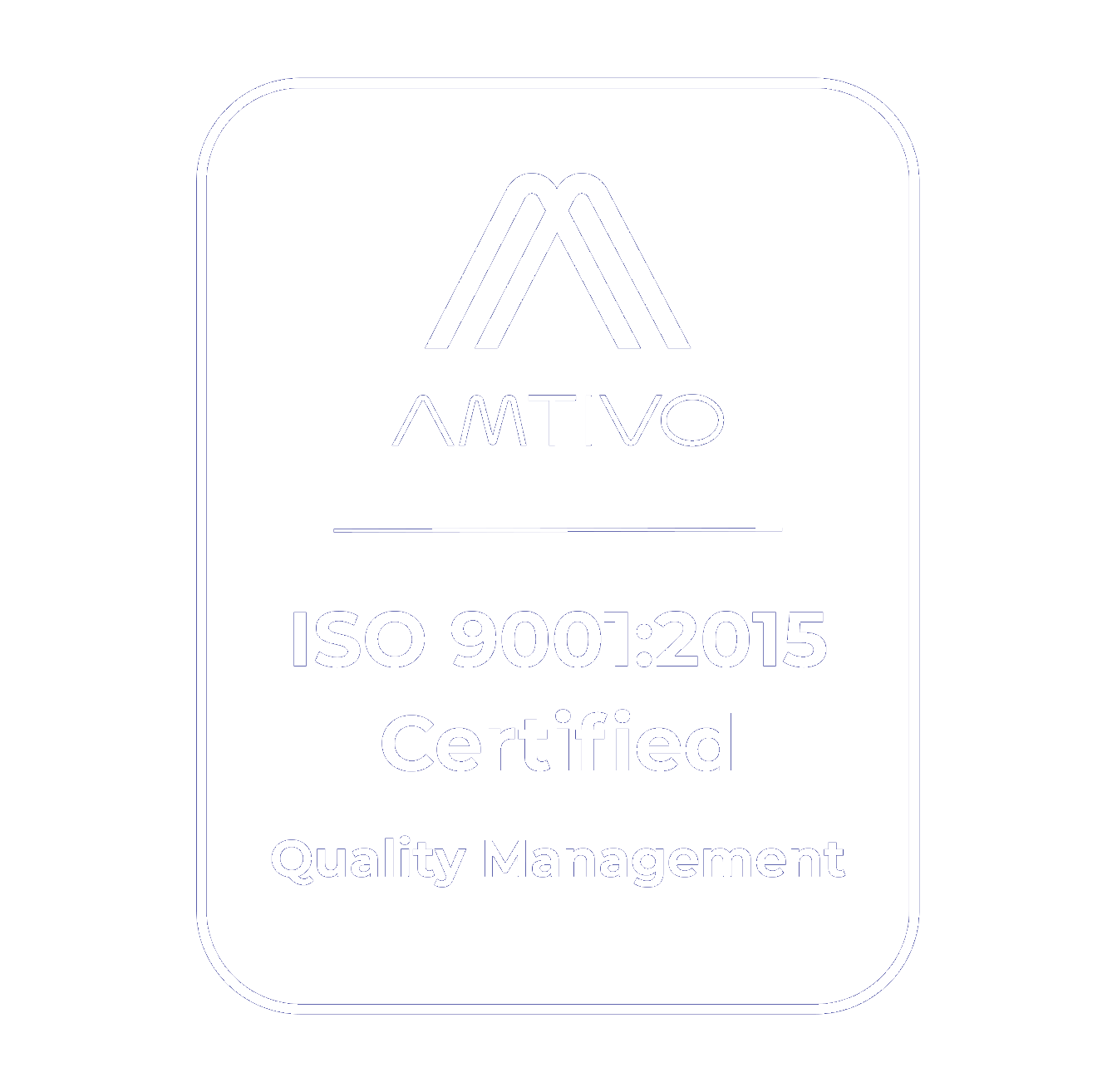Blogs
When you’re considering changing out your boat’s prop, you may be looking into a range of different options available on the market.
Beyond changing the propeller pitch to improve performance or accuracy, one of the biggest changes you can make is the type of material that is used in the propeller. Though some of these options will be limited by the mechanics of your lower unit, in many situations, you’ll be able to choose between a stainless steel prop and an aluminum prop.
Before making a decision, you might be wondering: What are the major differences between these types of propellers? Are there advantages that make the stainless steel prop worth the additional expense?
In this article, we’ll go through both propeller types, including the advantages of using a different prop. We’ll also cover the disadvantages so that you can make an educated decision as a boat owner and choose the right propeller for your watercraft.
Aluminum Propellers
If you’re visiting your local prop shop, you might notice that there are several advantages to purchasing an aluminum propeller. For most standard boating applications, this type of prop will work well.
Advantages of Aluminum Props
To start, aluminum props are very economical, often costing a third of what a comparable, stainless steel propeller will run. This is one of the top reasons why they’re selected so commonly for boats and are used by manufacturers, due to the lower cost of outfitting a boat.
Given their low cost of acquisition, it’s pretty common to see them used as a spare propeller as well because, for a low price, you gain a little insurance in the off chance you run into issues with your boat, such as a prop blade shearing off due to an impact while you’re out and about. With a few simple tools onboard, you can make repairs to get back to shore, where you can get a repair or replacement for your existing prop.
An aluminum propeller can also be easy to repair, especially when compared to a stainless steel propeller.
Disadvantages of Aluminum Props
Though there are some notable advantages, there are also some disadvantages to aluminum props. To start, aluminum is a strong but flexible material, which is among the reasons why it’s used in many types of boats and aircraft. However, this flexibility can cause the pitch on your propeller blade to change, which can reduce performance, especially on higher horsepower boats at high speeds. If performance is vital to your boat’s purpose, it may be worth looking at the more rigid stainless steel prop options.
If you’re expecting to pull all the performance you can from your outboard engine, another potential disadvantage is the thickness of an aluminum prop blade. Because aluminum blades are thicker than stainless propeller blades, they create more drag in the water, which lowers your top speed. If higher speeds are important to your operation, a stainless steel prop will make it easier to reach a higher top speed due to reduced drag.
The third disadvantage of aluminum propellers is that they are more likely to be damaged. If you’re only running in sandy conditions, this may not be an issue, but if there’s a lot of driftwood, rocks, or underwater obstacles, you’ll find yourself digging out a spare prop much faster with an aluminum prop on your outboard motor that you’ll see on a stainless steel prop.
Stainless Steel Propellers
Though you may initially balk at the higher cost of an average stainless steel propeller at your local prop shop, that cost also provides you with a range of options that will boost your boat’s performance and provide superior durability.
Advantages of Stainless Steel Props
To start, a stainless steel propeller will deliver better performance in an average 3-blade prop. At the same time, you won’t lose the better handling and superior hole shot that you’d expect from a lower-pitch propeller. This makes this type of propeller more efficient in the long run, making up some of the expense of purchase.
A stainless steel prop will also see superior durability and longevity. The same blow that may snap an aluminum propeller blade will often simply glance off of a stainless steel propeller, due to the higher level of durability as a simple aspect of using stainless steel.
The high performance that these propellers produce is caused by thinner blades that reduce drag and a stiffer, stronger profile that is able to cut through the water more efficiently. This loss of drag makes it easier for your motor to reach its true top speed, with superior efficiency.
Because stainless steel props operate more efficiently, you’ll experience better performance that leads to exceptional fuel efficiency in the motor, allowing you to get more boating in for less expense. These aspects can often defray much of the cost of upgrading to a quality stainless steel prop.
Disadvantages of Stainless Steel Props
For all these advantages, there are disadvantages as well. The main disadvantage of a stainless steel propeller is its cost. As a more expensive option, these propellers will cost more at the onset, but this cost is often defrayed through lower overall operational expenses, such as superior fuel economy, better performance, longer lifespan, and better durability.
Why does Boat Propeller Material Matter?
By taking these advantages and disadvantages into consideration, it’s easier to make a smart decision at the prop shop. However, to summarize what we’ve discussed, let’s take a quick look at the factors involved in daily operation to keep your boat operating smoothly and reduce your overall cost of operation.
Factors to Consider:
- What environment will you be in? Deep water is typically safe for aluminum, while you’d want to stick to sandy spots in shallow water unless you’re running a stainless steel propeller on your watercraft.
- What is your budget looking like? If you’re concerned about how much you want to spend, take a few minutes of basic price research, then let that information guide your decisions on what kind of budget you should have.
- What kind of performance level are you looking for? If you’re just tooling around doing a bit of fishing on the weekend, not having an ultra-efficient propeller may not be a problem. For a racing boat, on the other hand, you’d want a premium stainless steel propeller to ensure superior performance.
- Exactly how will you be using your boat? As mentioned above, an aluminum propeller is sufficient for most boats, with only boats that demand the best quality, performance, and top speed often rating a stainless steel propeller.
Michigan Wheel Propellers
Whether you decide to go with stainless steel or aluminum propellers, there is a wide range of options available at Michigan Wheel. From a simple 3-blade prop to a superior 4-blade prop that may deliver better acceleration, our team of experienced professionals can help you find the perfect propeller for your watercraft.
Among our many options in aluminum and stainless steel props are:
- The Vortex series of aluminum propellers in 3-blade and 4-blade props offer you a wide selection of options at an economical price point.
- The Ballistic series of stainless steel propellers include 3-blade, 3-blade XL, and 4-blade options; the tapered leading edges reduce drag even further.
- For the perfect hole shot and handling, Apollo‘s XHS series of propellers include 3-blade, 3-blade large diameter, and 4-blade configurations.
- Michigan Match combines a superior naval brass spindle with aluminum blades to provide both quality and durability in one tough package.
- We also offer propellers for a wide range of larger commercial, recreational and military boats, including 3- to 8-blade configurations.
Please feel free to contact us today with any questions, whether it’s for more details on our large lineup of replacement propellers, or to gain insight on which propeller is best for your boating needs. Whether you’re piloting a weekend runner, a cargo barge, or a military ship, Michigan Wheel has everything you need to keep things moving smoothly.







